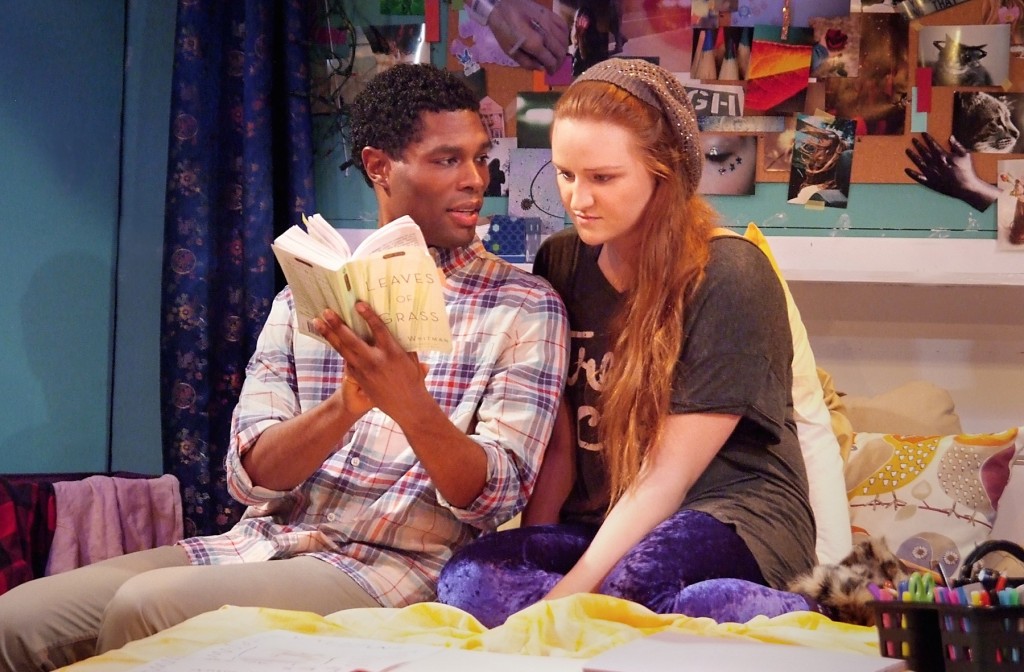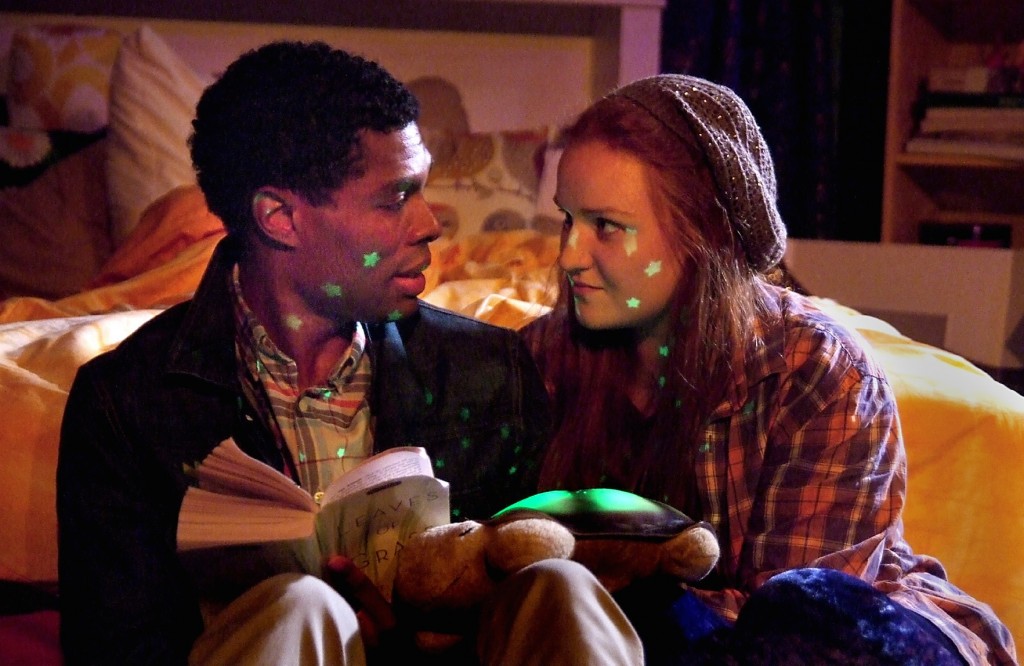It may be a little touchy to review a play late in the course of a long and lauded run, but… all is fair in love and criticism. Other theories notwithstanding, one writes about a production because it offers something to write about, and the idea at the core of Lauren Gunderson’s I and You (the pronouns deliberately transposed in the title of this two-hander) is indicative of a piece that wants to be more than the sum of its parts, even if it ultimately does not entirely deliver.
It opens on a kind of conversation interruptus. Caroline (Jennifer Finch) is in the middle of yelling at Anthony (Matthew Hancock) for coming up to her room uninvited, which is indicative of a play that wants to grab your attention really fast. It does, but then it also lets it go and wanders though a sludge of high school conversation surely of interest only to other high schoolers. How far beyond that can such talk carry?
Caroline doesn’t even know Anthony, so why does he barge in to her private sanctuary? Ostensibly, to work on a school project that Caroline knows nothing about. Now why would her mother let a strange boy march up to Caroline’s bedroom unannounced, with a plate of cookies in hand that she herself has baked for them? And why is Caroline apoplectic over all this?
Could it possibly be that it’s because this girl hasn’t been out of this claustrophobic bedroom for months now, except to visit doctors, or is it because she’s seriously ill and feels cheated of her youth and in fear for her life?
But I’m getting ahead of myself.
These snatches of information dribble out when Anthony resists Caroline’s attempts to throw him out or to ignore him — or when she rejects his efforts to involve her in this unforeseen school project about Walt Whitman by trying to get her to read from Whitman’s ever-shifting Leaves of Grass — or get her to listen to him read the Whitman aloud. The play’s first half meanders through more of this back-and-forthness than seems logical or necessary, and the spatial limitations of this young woman’s bedroom only add to the airlessness of this round-robin exchange.
Things do heat up eventually — too eventually — when truths emerge that finally start to connect these two individuals in more significant ways. Audience attention also begins to perk up, but it’s pretty late in the game. Since it’s clear from the get-go that we’re not going to be leaving the bedroom any time soon, there is little reason or opportunity to anticipate more than an equally enervating finale.

Fortunately, that is not quite what happens. The play radically changes course as implied elements of cosmic mysteries seep into the atmosphere, and the relationship between these two young persons becomes at once more contentious and (less felicitously) a lot more sentimental. The sentimentality is built-in — hard to avoid with a sick teenager who has well-founded intimations of her own mortality — but the energy brought on by the contentiousness allows the story to stand on more solid ground. Thanks to this late development, the play does open up some, both literally and figuratively. If it ends, after all, with a bang and not a whimper, we also have Whitman to thank for his ongoing role as modifier of this otherwise too simple one-on-one equation.
So the experiment is not altogether a loss, but it is much less of a gain than it might have been. While director Robin Larsen has breathed all the life she could into the script, actors Finch and Hancock relate to one another only spasmodically, with Finch coming off too often as overbearing and shrill when a more introspective and recalcitrant attitude might have been more productive and truer to the character.
As a consequence of the constraints presented by the small Fountain Theatre stage, and for structural reasons that become clearer near the end, Tom Buderwitz’s bedroom set, precise in all its carefully detailed minutiae, is also very cramped. Not a wrong outcome for a long-term sickroom, but in such a small theatre, a little suffocating from an audience’s point of view.
Gunderson’s play clearly sprang from a bold idea. That it succeeds about half the time is not a reason to give up on it, but perhaps to rethink, sharpen and refine the parts that don’t quite work. Two-handers have many strikes against them. They are overused, predictable and lack the nuance that the presence of other characters can provide. I and You is not especially predictable, but it does suffer from a gamut of emotions possible only between just I and You.

Top image: Jennifer Finch and Matthew Hancock in I and You.
All photos by Ed Krieger.
WHAT: I And You
WHERE: The Fountain Theatre, 5060 Fountain Avenue, Los Angeles, CA 90029.
WHEN: Pay What You Can Thursdays, today, June 4 & 11; Fridays & Saturdays 8pm; Sundays 2pm. Ends June 14.
HOW: Tickets $20-$34.95 (for premium seating, includes one drink), available at www.FountainTheatre.com or 323.663.1525.
